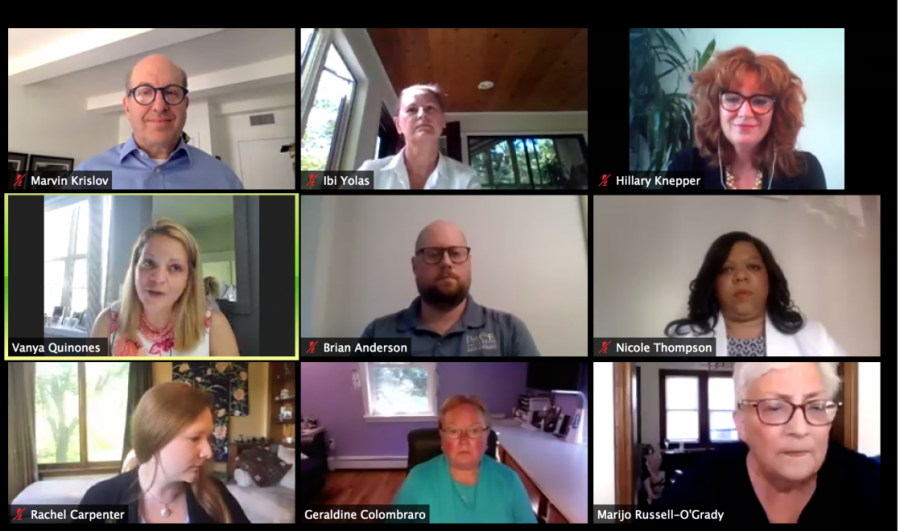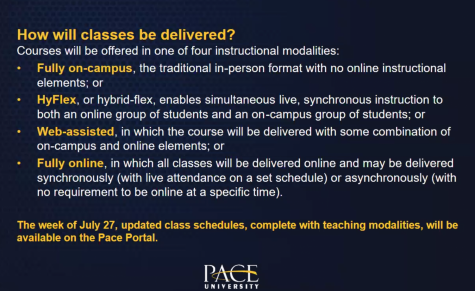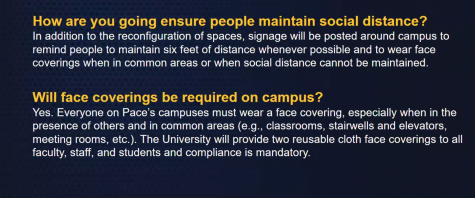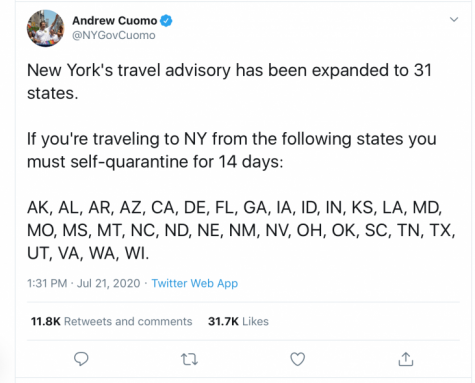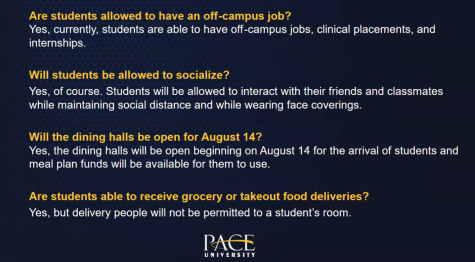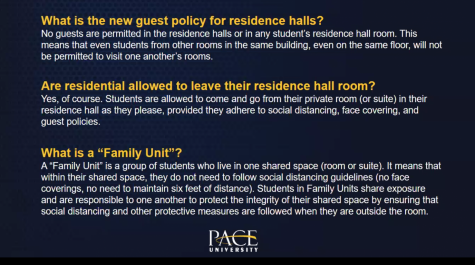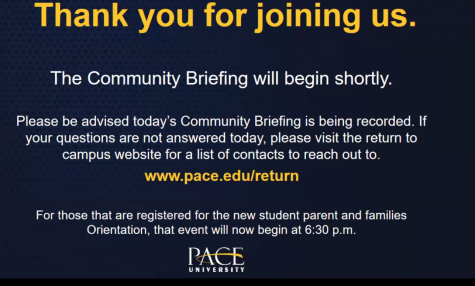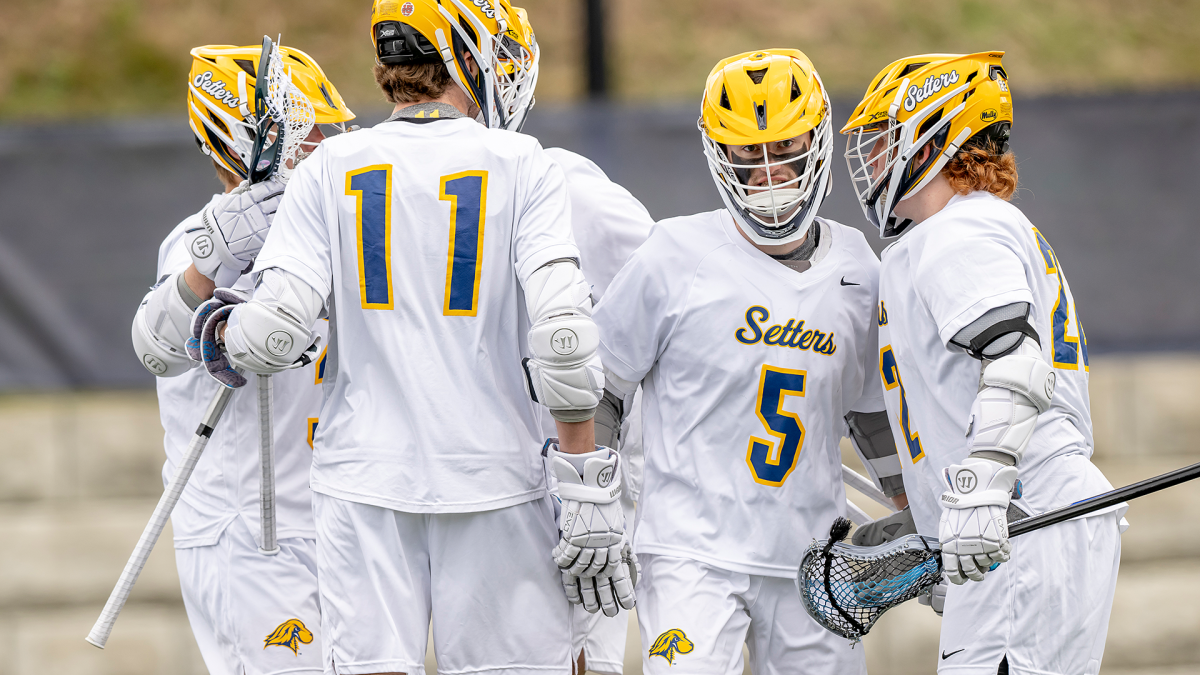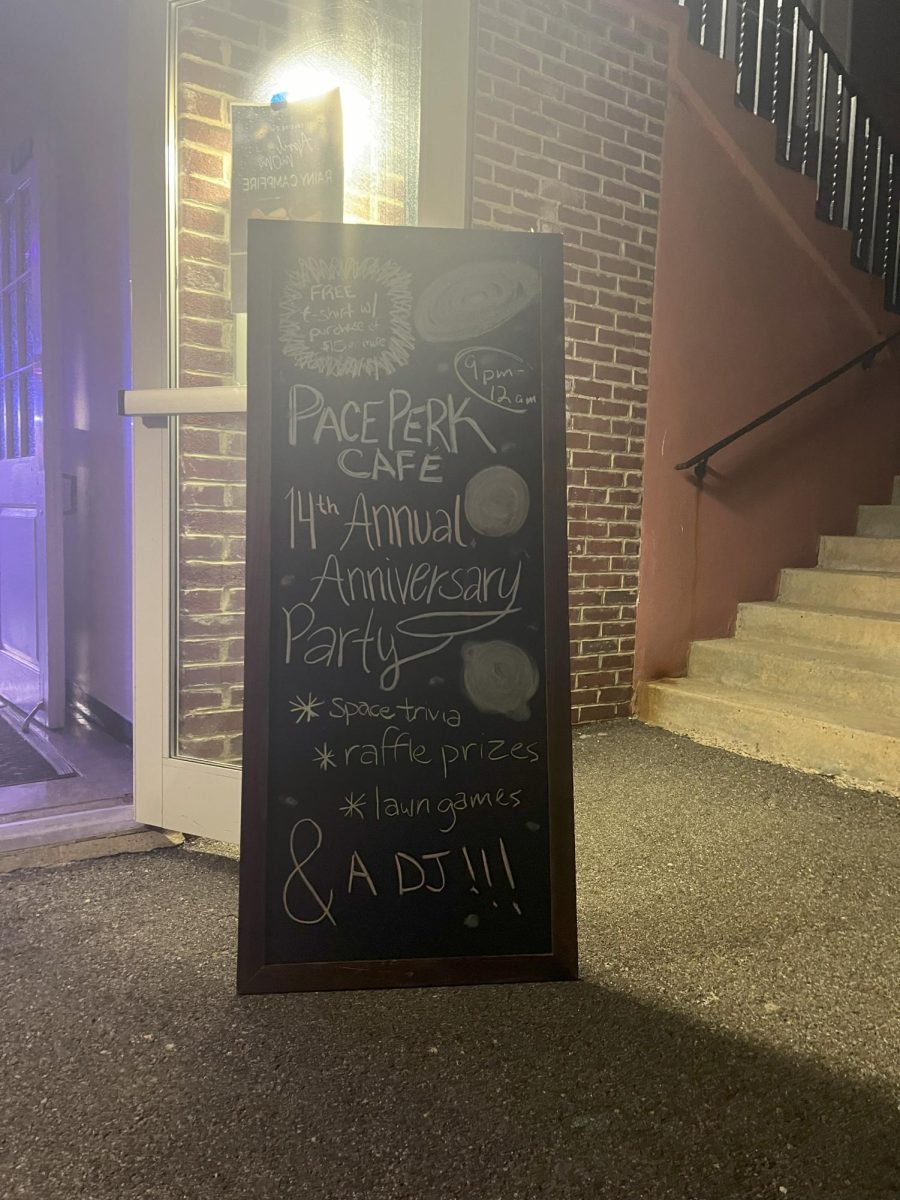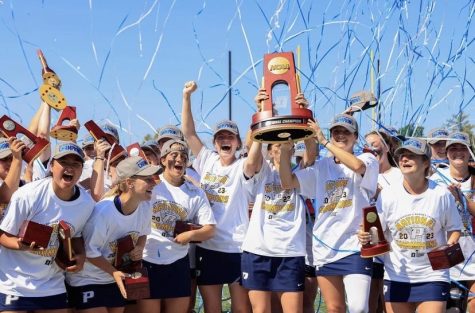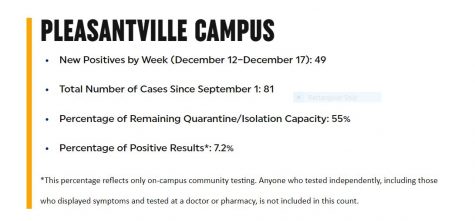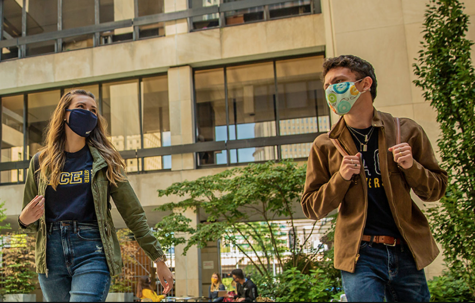Pace requiring all students to get COVID-19 tested
Pace held the second zoom community briefing for students and families. The panel consisted of the President/Provost, Dean for students and members of the universities Covid-19 Task Force
July 21, 2020
Pace held their second zoom community briefing with over 1200 students and families on July 21st to address concerns, policies and protocol’s that will be implemented for the Fall semester.
Provost Vanya Quiñones made clear that the university is following all New York State (NYS) and CDC guidelines, which means the situation is constantly evolving. Pace indicated that all their plans are flexible prior and during the semester.
As of July 21st, New York has entered Phase 4 throughout the state, which allows for higher education to take place.
President Marvin Krislov exclaimed, “We are determined to help all students stay on track to achieve educational goals and our committed to everyone’s safety & health.”
Pace discussed specific topics of concern through reading questions in the chat and through the pre-submitted questions during registration for the briefing.
Academically
- Pace is prepared for students remotely and in-person.
- Most students will be able to take all classes remotely, with exceptions of a few programs. However, students will also be able to take some of their classes in-person.
- All modalities will be released on July 27th through schedule explorer and their student schedule.
Here are the modality categorizations:
- Fully in-person: Some courses require the in-person hands-on interactions and an in person format for all classes would benefit the learning experience. This modality will be given priority to labs, clinicals and performance courses. Instructors of these courses have to be prepared to move to online instruction, if needed. Furthermore, they must accommodate student absences due to quarantine or isolation. This requires the material in these courses to be available to students asynchronously through recordings of classroom instruction and/or posting of materials.
- Fully online, asynchronously or synchronously : Some classes will be offered completely online. Instructors will have to state whether the course will be taught asynchronously or synchronously. In both scenarios, all course materials must be accessible to students asynchronously through recordings that will be posted online.
- Web-assisted: Some courses may use a mix of on-campus sessions with online, asynchronous or synchronous elements. This modality may include a flipped classroom pedagogy, having half the class live via the web and half in-person or instruction may involve remote learning for certain material and on-campus instruction for other learning objectives.
- HyFlex: This format allows live, synchronous instruction to both an online group of students and an on-campus group of students. This format would include students alternating between in-person/online. The hyflex allows social distancing to happen in the classroom, with the reduction in classroom density.
- Once these modalities are released advisors will reach out to you, or you can immediately reach out to your advisors for assistance regarding the modality you prefer for the semester.
- You can switch modalities until the start of the semester on Aug. 24th.
- There will also be the typical add/drop period for the first two weeks of the semester.
- Faculty will also be available to answer questions regarding how they specifically will run their courses within the categorizations the university is utilizing to classify them.
- All classes and instructors are prepared to switch fully to remote learning if needed and will accommodate those in quarantine/isolation.
- All professors/adjuncts have completed online learning training.
Safety and Health
- All students will have to be COVID-19 tested within two weeks prior to entering campus and arrive to campus with a negative test. Furthermore, residential students will be tested again within the first week of classes.
- At this time, it is still being decided whether staff and faculty will also have to undergo COVID-19 tested.
- Daily health screening questionnaire will be required for all students, staff and faculty. This is located on the Pace Safe App and is available now.
- There will be required training for students, staff and faculty prior to semester start.
- Pace has reviewed occupancy levels and circulation patters. Signage and floor markings will be utilized to educate students on directions and spacing.
- Students will have designation on how to use space.
- Students who have to be reminded multiple times to follow social distancing and put a mask on will face conduct concerns because their behavior can be considered a threat to public health.
- Classrooms have a 6 foot social distance separation from desks and there will be plexiglass between students and instructors.
- Staircases are assigned with indication of whether it is for up or down.
- Elevator has reduced capacity and signage on where to stand, as well as which way to face.
- Pace has added a new disinfecting team, which will be identified with a different uniform.
- There will be an increase in cleaning frequency, evening cleaning and electrostatic cleaning.
- Air filter changes with UV Light.
- There is additional air circulation and filter measures.
- Some bathrooms will be off limits. Likely it will be every other stall.
- Hand sanitizer machines and disinfecting wipes are located all over campus.
- There will be limited visitation on-campus.
Quarantine
- Residential students who are moving into Pace, from one of the 31 states required to quarantine in the tai-state area, will be quarantined for two weeks. Quarantine residential students will be placed in hotels for 14 days. There will be residential life staff located in those hotels.
- These hotel spaces are a single room. Families who come from out-of-state will also be required to quarantine.
- Pace will take care of all meals and internet access.
- Pace will work with individual families if they want to make other accommodations for their quarantine.
- If you are located in the tri-state area/ are a commuter and you go on vacation, you must complete the 14 day quarantine at home.
- During the course of the semester, Pace has set aside specific rooms for isolation on campus.
- Students will be checked on daily for mental health concerns, food, medicine and social interaction by Pace staff. Furthermore, there will be virtual events, telementalhealth and other activities available.
- Students who are facing quarantine/isolation will not be penalized academically.
If someone tests positive for Covid-19
- They will report it to the new position on-campus, the Covid-19 Coordinator.
- This individual will work with them and New York State’s contact tracing to find who they were in close contact with. (Within 6ft for more than 15 minutes)
- The individual will have to complete quarantine and isolation, in addition to those they were in close contact with.
- If they are a residential student, they will be placed in an isolation room. Pace staff will check on those students daily for mental health concerns, food, medicine and social interaction.
Student life/Support Services
- Learning centers, libraries & academic advisors are ready to serve all students.
- Pace will not be restricting students to stay on-campus. However, they advise students to be responsible about where they are going and avoid being exposed to COVID-19.
- If you leave and attend a state where a 14 day quarantine is required, you must comply to NYS guidelines and complete the quarantine
- Students will not need to return to campus, after Thanksgiving Break for the holidays. At this moment, students can leave stuff in their dorms for the spring and just take what they want for the long Winter break.
- Students can recieve food and grocery delieveries at one of the security stations located on campus. Door-to-Door deliveries are not permitted.
- The dining halls will be increasing the utilization of a mobile program for dining. This will allow students to order their food online and pick-up at a pick-up station on campus.
- Student organizations will be hosting virtual, social distanced outdoor and some social distanced indoor events.
- There will be trainings on how to host a social distanced events, as well as virtual events.
- The events will likely have different timings and spaces will have a different look.
Move-in
- Move-in will approximately begin on August 14th and last until week 1 of September. This allows for flexibility with the required 14 day quarantine for out-of-state individuals and increases the number of time slots.
- Time slots will be physically distanced.
- You are allowed (at this time) 2 people to assist with the move-in process. All members must have face coverings.
Tuition and Fees
- Pace will not be reducing tuition , as tuition is to support the same education, services, instructors and technology that will be available remotely/ in-person.
- In addition, Pace has significantly amped up technology to increase the quality and access for remote learning.
- If the semester, is to be transitioned to fully online, credit adjustments for room and board will be made week-by-week. These amounts will be seen on the Pace Portal
Measures for transition to all remote learning.
- Case rates/ hospitalization rates
- New York State parameters/guidelines and CDC guidelines.
Welcome Back Pacts
- Every staff, faculty & student will be required to wear face coverings. Pace will provide everyone with 2 reusable cloth face coverings.
- In addition, each security locations will have materials there if a student, staff or faculty forgets their masks.
Deferring the Semester
- For both incoming and returning students, If you defer for 1 semester, everything remains same. However, if you defer for 2 semester, you will need to reapply.
- Some programs of study will be more challenging to reapply for.
- Pace recommends talking with admissions and advisors.
Pace Security
In the chat, parents asked questions regarding the safety of the New York City campus with the increase of protests taking place.
- The vast majority of New York City protests have been peaceful.
- Security has been monitoring all activity amongst all campuses as they normally do.
- They will make staging adjustments accordingly.
- The Pace alert system will be utilized if safety is an issue.
- The Pace Safe App has multiple features that can assist.
- A friend walk allows students to have another individual walk with them.
- There is a Direct line to security through the app
- Security officers will walk with anyone from 1 building to another. ( This is used more on the pleasantville campus than NYC)
- Pace has Emergency Management connections and is in contact with local law enforcement to keep campus safe.
The recorded community briefing can be found here: https://www.youtube.com/watch?v=PWzJrg09nEY&feature=youtu.be

